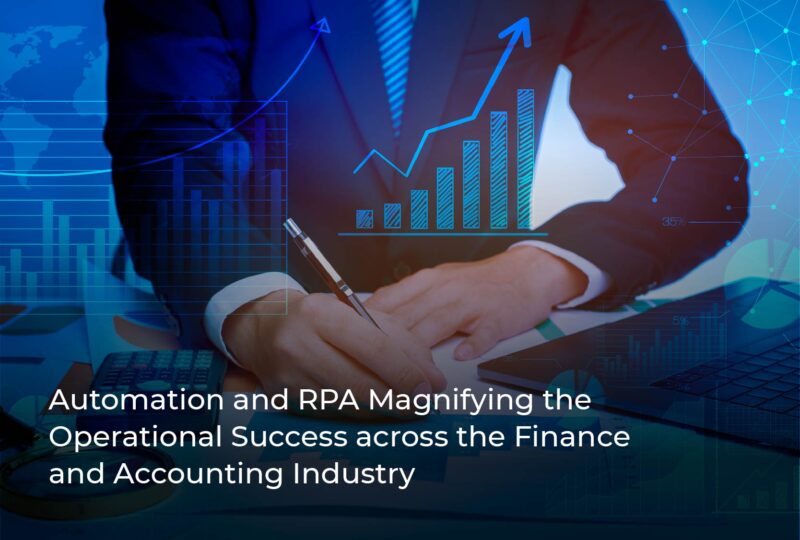Every organization’s finance and accounting departments are overburdened due to the lack of trained resources, increased transactional volume, repetitive manual tasks, and siloed and diverse input sources. And, adding new employees will never eradicate the problem as the training and remuneration will multiply drastically. The smartest move is to fill these productivity gaps in the financial sector with the power of automation and RPA.
Robotic Process Automation has emerged as the fastest-growing solution across the finance sector, transforming all human-driven processes in order-to-cash, record-to-report, and procure-to-pay. It eliminates all data entry errors to deliver complete accuracy and slashed processing times—at the minimum possible cost compared to the manual team. RPA allows enterprises to benefit from a quick implementation and lightning-fast ROI immediately.
Financial institutes globally, are still treading water and struggling to mitigate human involvement to boost their output drastically and seamlessly. Usually, they start small with tightly articulated pilot programs that have limited funding but more explicit objectives. In multiple countries, the tax impositions and legalities are too complex to be managed proficiently by humans. In such a scenario, RPA solutions can allow these teams to spend comparatively less time on repetitive activities and focus on developing their strategic goals.
Considering the finance industry, below are the top activities that impact productivity and control:

Download of Tax Return Files: It is very common for companies to spend time for a collaborator to access the accounts and download the tax return files or slips to carry out the reconciliation later. This task can be time-consuming and could inflict errors in the operations.
Account Receivable or Accounts Payable Automation: AR or AP Automation allows modernization of all accounts receivable or payable processes leveraging RPA and electronic systems for a more prompt delivery mechanism of invoices.
Invoice Processing Automation: Automation of invoice processing simplifies invoice data extraction, information population in the accounts payable system, and invoice data processing. Effectively used, all invoice automation systems save valuable time and money.
Month-end Closing: Month-end closing automation platforms simplifies all critical month-end tasks expediently, as the software handles all complicated calculation at a single click.
Automated Reconciliation: Automated reconciliation effectively speeds up all accounting processes by automatically verifying all bank statements against transaction records.
Processes Payment Slips in the ERP: Businesses automate not only the download of bills, receipts or collection but also it’s processing in the management platforms such as SAP and/or TOTVS, eliminating the need to deploy an FTE to overlook this activity.
Update Varied Certificates: Many companies need to keep several certificates updated, and for that, they need to control and access several websites. With automation, businesses can leave these activities with a robot, executing them more often, and tracking their maturity date.
Registration and Validation of Suppliers: For some customers, the volume of new supplier requests are much higher, and so they struggle with the registration process every time they add new suppliers. By automating this task, teams can save the registration time and perform a more constant audit on these suppliers for their tax framework more simply and regularly. This will save the time spent on these tasks by the employees, boosting the revenue further.
[Also Read: Why, Where and How of RPA in Banking and Financial Services Industry ]
Top Benefits of Finance Process Automation
Financial automation eliminates all clunky procedures, freeing humans from the heavy-lifting tasks. Below mentioned are the few top benefits that finance process automation delivers across industries.
Data Integrity: Even the companies with the best finance teams have a massive scope of error as they rely on many things beyond human control. Minor mistakes, changing policies, or difficult suppliers make it challenging to maintain data accuracy. With automation kicking in, enterprises can be confident about zero data errors so that the numbers provided are absolutely accurate.
Improved Efficiency: Shifting from the manual processes to automated ones can allow the finance teams to smoothen all their existing functions. An automatic and reliable one should replace any legacy system that slows the finance team down.
Quicker Approvals: Whether it’s about the budget approval or a significant reimbursement claim, automated approval systems act as a blessing. As an add-on advantage, one can also eliminate all unwieldy email threads required to check each ticket’s status.
360-Degree Visibility: With all systems getting inter-connected, financial teams can get a complete, 360-degree picture of all finances. It helps to understand the proper logic behind all fluctuating financial reports, allowing employees to make quicker and smarter business decisions.
Currently, organizations have built-in their individual automated fraud detection systems to tackle such threats proactively. Most of these mechanisms are based on RPA techniques, allowing banks to monitor and eliminate all threats before they turn out to be unmanageable. Automated notifications and alerts can be generated to relevant parties involved, to trigger a chain of events to ensure timely recovery. Such advanced technology, coupled with predictive analytics and machine learning platforms, can analyze all existing data and track all previous threats to establish a robust defence mechanism to all fraudulent transactions.
[Also Read: Automate Credit Card Processing to Enhance Customer Experience ]
Managing the daily flow of investments and expenses across an organization needs a lot of technical know-how, pressure-handling capabilities, and mental abilities. Bookkeeping and other financial responsibilities involve complicated math. Accountants need to remain on top of floating exchange rates, government regulations, changing international financial standards, and certain strategic executive decisions. Hence, automation and RPA are the new way of finance departments operate, allowing people to redefine their focus on high-value activities for themselves and their company – paving the way for digital transformation!
